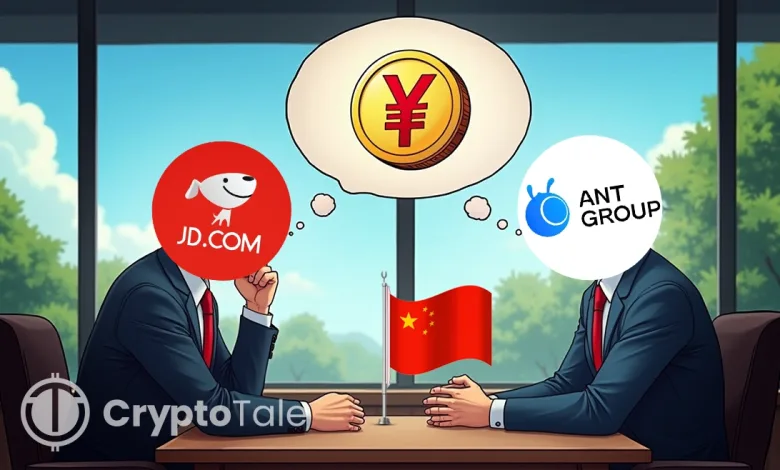China Tech Giants Push for Yuan Stablecoins in Hong Kong

- JD.com and Ant Group urged China to approve yuan stablecoins for global payment systems.
- China may allow offshore yuan tokens as demand for non-dollar stablecoin options rises.
- U.S. leads with stablecoin law while China faces pressure to grow the yuan’s digital use.
China’s e-commerce giant JD.com and fintech firm Ant Group have requested that the People’s Bank of China (PBOC) approve yuan-backed stablecoins to counter the growing global use of U.S. dollar-pegged digital tokens. The move seeks to launch stablecoins tied to offshore yuan in Hong Kong.
According to a Reuters report, executives from JD.com held private meetings with PBOC officials. They argued the yuan needs digital representation in global trade to keep pace with the dollar’s influence in stablecoins.
JD.com emphasized that launching yuan stablecoins is urgent to improve the efficiency of cross-border payments. The company proposed launching the token in Hong Kong, then expanding into China’s free trade zones. Ant Group, the fintech affiliate of Alibaba, has also expressed readiness by preparing license bids in both Hong Kong and Singapore.
Wang Yongli, co-chairman of Digital China Information Service Group and former vice head of the Bank of China, said during discussions, “It would be a strategic risk if cross-border yuan payment is not as efficient as dollar stablecoins.”
Beijing and Washington Step Up Regulatory Moves
The request from JD.com and Ant Group comes as the United States pushes ahead with stablecoin regulations. The Senate recently approved the Guiding and Establishing National Innovation for US Stablecoins Act (GENIUS Act). This legislation establishes clear guidelines for stablecoin issuance, including mandatory reserves, regular audits, and adherence to anti-money laundering laws.
As U.S. lawmakers move forward, Chinese policymakers are quietly considering similar steps. Advisors within the PBOC are signaling growing support for the idea of yuan-based stablecoins. The move would represent a significant shift from the country’s earlier stance, which banned cryptocurrency in 2021.
Even though China remains strict on crypto, the push for yuan-backed tokens represents a targeted strategy. Xiao Feng, chairman of HashKey Group, stated that an increasing number of exporters are now utilizing USDT, a popular dollar-pegged stablecoin, due to the ease of payments from foreign merchants. Ant Group and JD.com are already preparing to launch stablecoins backed by the Hong Kong dollar in August. However, they argue that this is insufficient because the Hong Kong dollar is tightly pegged to the U.S. dollar, which does not directly enhance the yuan’s international profile.
Related: GF Securities, HashKey Launch Tokenized Assets in Hong Kong
Strategic Stakes in the Race for Stablecoin Leadership
The debate over stablecoins now echoes a broader race between China and the U.S. to lead the future of digital currency. The proposal to issue a yuan-pegged stablecoin is part of a larger ambition to strengthen China’s influence in digital finance and trade.
Whereas the U.S. GENIUS Act focuses on consumer protection and national interest, China targets maintaining the yuan’s position in the cross-border settlement system. JD.com and Ant Group believe that the regulatory framework for stablecoins in Hong Kong, which incorporates licensing and regulation, still lacks emphasis on the superiority of currency.
The global share of the yuan in trade settlements has been declining. Industry players argue that issuing yuan-pegged stablecoins can restore competitiveness by offering a trusted alternative to dollar-based tokens.
In private meetings, JD.com told Chinese authorities that stablecoins based on the offshore yuan could expand rapidly in Hong Kong, which has already launched a new digital asset licensing regime. They see the digital yuan as slow-moving compared to market-driven stablecoins like USDT and USDC. If approved, the yuan stablecoin could alter the global financial landscape, offering new options for cross-border settlement and reshaping digital currency geopolitics.




